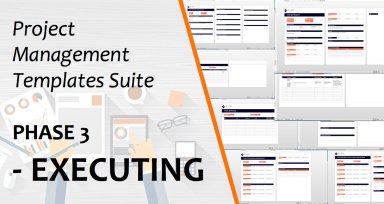
Last version published: 08/05/2019 10:03
Publication number: ELQ-97819-2
View all versions & Certificate

Project Management Templates - Phase 3 - EXECUTING
9 Templates for Phase 3 - PROJECT EXECUTING (Initiating, Planning, Executing, Monitoring, Closing).
Further information
Program management is the process of planning, monitoring, controlling and evaluating several projects. All of the projects are combined into a portfolio in a program management office, which monitors how each project may be linked or related, the costs of each project and also risks that are involved with each project. In the field of program management, the outputs or end results of each project are a main focus. Evaluation of program management outputs contributes to future planning that is required to ensure that the right projects are selected within a portfolio to maximize organizational performance.
Managing Projects
One objective of program management is to manage a variety of related projects. As such, projects may be scheduled at the same time or at different time intervals. A program management office is responsible for linking strategies for each of the projects into actions that will enable continuous improvement in the field of program management, as well as a consistency in its practices and procedures. Providing direction in program management is very important in the administration of programs. For this reason, the Project Management Institute focuses on governance of the field of program management.
Managing Resources
A second object in program management is to efficiently and effectively manage resources. This includes resources that are both internal and external to a program. According to the Project Management Institute, stakeholder management is integral in the program management resources. Stakeholders are program management authorities, managers and end-users or customers. Without total participation of stakeholders, program management will be unsuccessful. Management of resources is required because programs may be global and comprised of complex activities or tasks, often involving different cultures and geographic regions.
Controlling Risks and Project Costs
Other objectives of program management include controlling project risks and project costs by conducting a risk analysis. A risk analysis consists of identifying, analyzing and prioritizing risks to provide realization of benefits in a program. Identification of risks requires documentation of known, current events that affect a project's cost, schedule or overall performance and also documentation of events that may occur in the near future, during the life cycle of a project. Analysis of risks enables a plan to mitigate strategies by describing how risks can be minimized, eliminated, avoided or transferred to another source. Once risks are prioritized, costs of each project within a program are configured to ensure that projects are within an organization's budget.
These tools can be used in the program management of projects ranging from small to large value across industries.
N.A.










